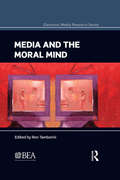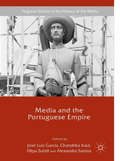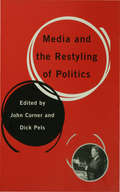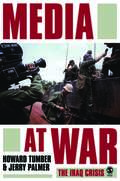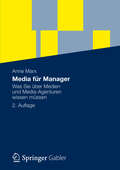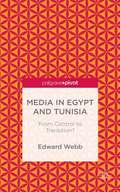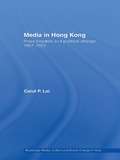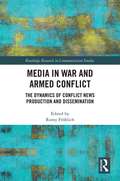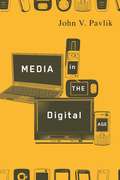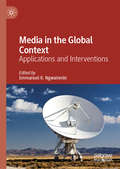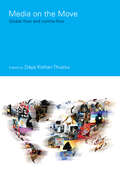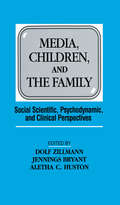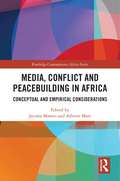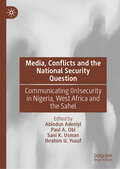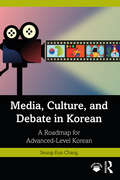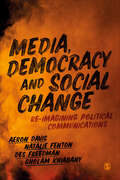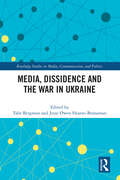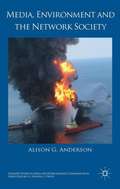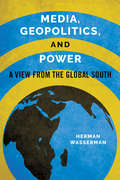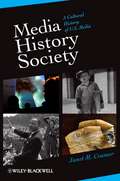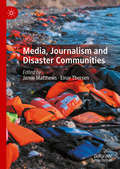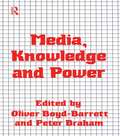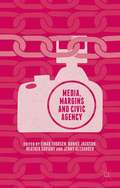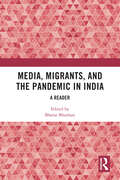- Table View
- List View
Media and the Moral Mind (Electronic Media Research Series)
by Ron TamboriniQuestions regarding the relation between media and morality have been a lasting concern. Can media exposure shape or alter moral values? Does morality influence how audience members select, interpret and respond to media content? Attempts to answer such questions are hindered by the complex nature of morality and its dynamic relation with media. This volume brings together leading scholars in an effort to examine reciprocal processes that connect media with morality, and to set a course for understanding this association. Individual essays combine established and emerging theories from media and moral psychology to explain how fundamental mechanisms that govern moral reasoning can shape and be shaped by media exposure. Together these scholars provide an understanding of the relationship between media and morality that should serve as an invaluable resource for current and future generations of researchers.
Media and the Portuguese Empire
by José Luís Garcia Chandrika Kaul Filipa Subtil Alexandra SantosThis volume offers a new understanding of the role of the media in the Portuguese Empire, shedding light on the interactions between communications, policy, economics, society, culture, and national identities. Based on an interdisciplinary approach, this book comprises studies in journalism, communication, history, literature, sociology, and anthropology, focusing on such diverse subjects as the expansion of the printing press, the development of newspapers and radio, state propaganda in the metropolitan Portugal and the colonies, censorship, and the uses of media by opposition groups. It encourages an understanding of the articulations and tensions between the different groups that participated, willingly or not, in the establishment, maintenance and overthrow of the Portuguese Empire in Angola, Mozambique, S#65533;o Tom#65533; e Pr#65533;ncipe, Cape Verde, Guinea-Bissau, India, and East Timor.
Media and the Restyling of Politics: Consumerism, Celebrity and Cynicism
by John Corner Dr Dick PelsWithin media research and cultural studies, the mediation of politicians and the play-off between versions of high and low politics are attracting increasing interest. Media and the Restyling of Politics brings together the work of leading academics in media and cultural studies to pursue an agenda of research, analysis and debate about the changing nature of political culture and its mediation. The contributors question the ways in which emerging forms of political style relate not only to new conventions of celebrity and publicity but to ideas about representation, citizenship and the democratic process. Topics covered include: celebrity politicians, the marketing of politics, identity and popular culture.
Media at War: The Iraq Crisis
by Howard Tumber Jerry Palmer′Tumber and Palmer have provided an invaluable review of how journalists covered and reported the Iraq war and its aftermath. Their exhaustive research has resulted in an impressive analysis that makes this book essential reading′ - John Owen, Executive Producer of News Xchange and Visiting Professor of Journalism, City University ′This is a meticulously researched book that lays bare the way the war was reported. Decide for yourself whether the media ′embeds′ - of whom I was one - were the world′s eyes and ears inside the military, or merely the puppets of the Pentagon and the Ministry of Defence in London′ - Ben Brown, BBC ′Media at War offers insights into the ways in which media at war inevitably become participants in both the military and the political wars′ - Professor Michael Gurevitch, University of Maryland International media coverage of the war in Iraq provoked public scrutiny as well debate amongst journalists themselves. Media at War offers a critical overview of the coverage in the context of other preceding wars, including the first Gulf War, and opens up the debate on the key questions that emerged during the crisis. For example, - What did we actually gain from ′live, on the spot′ reporting? - Were journalists adequately trained and protected? - How compromised were the so-called ′embedded′ journalists? Tumber and Palmer′s analysis covers both the pre-war and post war phase, as well as public reaction to these events, and as such provides an invaluable framework for understanding how the media and news organisations operated during the Iraq Crisis.
Media für Manager
by Anne MarxDieser praktische Leitfaden hilft Produkt- und Marketingmanagern, gegenüber Media-Anbietern und -Agenturen kompetent und souverän aufzutreten. Sie erfahren, wie Agenturen arbeiten und wie Sie von Ihrer Agentur eine optimale Leistung einfordern, was eine erfolgreiche Media-Planung ausmacht und welche Mediengattungen und Werbeformen Sie kennen sollten. Ein kompakter und verständlicher Überblick über die Media-Basics! Die 2. Auflage wurde aktualisert und die Themen Social Media, Gaming, Mobile Marketing, Digital Retailling, Crossmedia Integration und TV grundlegend neu konzipiert.
Media in Egypt and Tunisia: From Control to Transition?
by Edward WebbThis book examines the mass media systems of Egypt and Tunisia under the pre-uprising regimes, with a focus on the last decade of the Mubarak and Ben Ali periods, as well as on how media are adapting to the political transitions underway. Findings are based on extensive interviews with journalists.
Media in Hong Kong: Press Freedom and Political Change, 1967-2005 (Media, Culture and Social Change in Asia)
by Carol P. LaiThis book examines the Hong Kong media over a forty year period, focusing in particular on how its newspapers and TV stations have struggled for press freedom under the colonial British administration, as well as Chinese rule. Making full use of newly declassified material, extensive interviews and specific case-studies, it provides an illuminating analysis of the dynamics of political power and its relationship with media censorship. Overall, this book is an impressive discussion of the evolving face of the Hong Kong media, and is an important contribution to theoretical debates on the relationship between political power, economics, identity and journalism.
Media in War and Armed Conflict: Dynamics of Conflict News Production and Dissemination (Routledge Research in Communication Studies)
by Romy FröhlichThis book focuses on the social process of conflict news production and the emergence of public discourse on war and armed conflict. Its contributions combine qualitative and quantitative approaches through interview studies and computer-assisted content analysis and apply a unique comparative and holistic approach over time, across different cycles of six conflicts in three regions of the world, and across different types of domestic, international and transnational media. In so doing, it explores the roles of public communication through traditional media, social media, strategic communication, and public relations in informing and involving national and international actors in conflict prevention, resolution and peace-keeping. It provides a key point of reference for creative, innovative, and state-of-the-art empirical research on media and armed conflict.
Media in the Digital Age
by John PavlikDigital technologies have fundamentally altered the nature and function of media in our society, reinventing age-old practices of public communication and at times circumventing traditional media and challenging its privileged role as gatekeepers of news and entertainment. Some critics believe these technologies keep the public involved in an informed discourse on matters of public importance, but it isn't clear this is happening on a large scale. Propaganda disguised as news is flourishing, and though interaction with the digital domain teaches children valuable skills, it can also expose them to grave risks. John V. Pavlik critically examines our current digital innovations-blogs, podcasting, peer-to-peer file sharing, on-demand entertainment, and the digitization of television, radio, and satellites-and their positive and negative implications. He focuses on present developments, but he also peers into the future, foreseeing a media landscape dominated by a highly fragmented, though active audience, intense media competition, and scarce advertising dollars. By embracing new technologies, however, Pavlik shows how professional journalism and media can hold on to their role as a vital information lifeline and continue to operate as the tool of a successful democracy.
Media in the Global Context: Applications and Interventions
by Emmanuel K. NgwainmbiThis book investigates ways in which global media coverage of conflicts affects the worldviews of the social and cultural values of nationals from the war regions. It identifies the cultural patterns in remote communities that have been ‘diluted’ by IT and the extent to which the changes impacted the values of the indigenes. It also describes the role that IT especially social media and broadcast media play in the understanding of war among residents in highly wired and remote communities, respectively.
Media on the Move: Global Flow and Contra-Flow (Communication and Society)
by Daya Kishan ThussuMedia on the Move provides a critical analysis of the dynamics of the international flow of images and ideas. This comes at a time when the political, economic and technological contexts within which media organisations operate are becoming increasingly global. The surge in transnational traffic in media products has primarily benefited the major corporations such as Disney, AOL, Time Warner and News Corporation. However, as this book argues, new networks have emerged which buck this trend: Brazilian TV is watched in China, Indian films have a huge following in the Arab world and Al Jazeera has become a household name in the West. Combining a theoretical perspective on contra-flow of media with grounded case studies into one up-to-date and accessible volume, Media on the Move provides a much-needed guide to the globalization of media, going beyond the standard Anglo-American view of this evolving phenomenon.
Media, Children, and the Family: Social Scientific, Psychodynamic, and Clinical Perspectives (Routledge Communication Series)
by Jennings Bryant Aletha C. Huston Dolf ZillmannThis book brings together a group of scholars to share findings and insights on the effects of media on children and family. Their contributions reflect not only widely divergent political orientations and value systems, but also three distinct domains of inquiry into human motivation and behavior -- social scientific, psychodynamic (or psychoanalytical), and clinical practice. Each of these three domains is privy to important evidence and insights that need to transcend epistemological and methodological boundaries if understanding of the subject is to improve dramatically. In keeping with this notion, the editors asked the authors to go beyond a summary of findings, and lend additional distinction to the book by applying the "binoculars" of their particular perspective and offering suggestions as to the implications of their findings. One of the goals of the conference that resulted in this book was consensus building in the area of media and family. From examining the findings and insights of a diverse group of scholars, it seems that consensus building in several areas is a distinct possibility. Addressing the concerns of educators about the influence of the mass media of communication -- entertainment programs in particular -- on children and the welfare of the nuclear family, this volume projects directions for superior programming, especially for educational television. The influence of sex and violence on children and adults is given much attention, and the development of moral judgment and sexual expectations, among other things, is explored. The critical analysis of media effects includes examination of positive contributions of the media, such as the search for missing children and exemplary educational programs.
Media, Conflict and Peacebuilding in Africa: Conceptual and Empirical Considerations (Routledge Contemporary Africa)
by Jacinta MaweuThis book explores the role and place of popular, traditional and digital media platforms in the mediatization, representation and performance of various conflicts and peacebuilding interventions in the African context. The role of the media in conflict is often depicted as either ‘good’ (as symbolized by peace journalism) and ‘bad’ (as exemplified by war journalism), but this book moves beyond this binary to highlight the ‘in-between’ role that the media often plays in times of conflict. The volume does not only focus on the relationship between mass media, conflict and peacebuilding processes but it broadens its scope by critically analysing the dynamic and emergent roles of popular and digital media platforms in a continent where the semi-literate and oral communities still rely heavily on popular communication platforms to get news and information. Whilst social media platforms have been hailed for their assumed democratic and digital dividends, this book does not only focus on these positive aspects but also shines a light on dark forms of participation which are fuelling racial, gender, ethnic, political and religious conflicts in highly polarized and stratified societies. Highlighting the many ways in which traditional, digital and popular media can be used to both escalate conflicts and promote peacebuilding, this volume will be a useful resource for students, researchers and civil society groups interested in peace and conflict studies, journalism and media studies in different contexts within Africa.
Media, Conflicts and the National Security Question: Communicating (In)security in Nigeria, West Africa and the Sahel
by Abiodun Adeniyi Paul A. Obi Sani K. Usman Ibrahim U. YusufThis book explores how the media, and journalism in a cross-disciplinary sense, has treated conflicts in Nigeria, West Africa and the Sahel. Contributors connect theoretical foundations with practical experiences in the study of media, conflicts and national security, seeking to unravel the mediated and communication logic(s) in news coverage and analyse the media's role in pre-conflict, in-conflict and post-conflict discourses. The work maps out the impact of mediated narratives on security, risk, terrorism, banditry and general society, relying on local, on-the-spot and ontological cultural experiences in Africa, especially Nigeria, Ghana, Sierra Leone and other parts of West Africa.
Media, Culture, and Debate in Korean 미디어, 문화, 토론을 통한 고급 한국어 수업: A Roadmap for Advanced-Level Korean
by Seung-Eun ChangMedia, Culture, and Debate in Korean provides a roadmap for an advanced-level Korean course centered around media and culture and includes access to an archive of virtual media resources such as film, documentary, shows, newspaper, drama, music, and advertising. The book is designed to help students enhance their language skills and to deepen their knowledge and understanding of contemporary Korean society and culture through the analysis of authentic Korean media resources and debate. It addresses the cultural issues permeating Korean society that are rapidly transforming people’s perspectives, language, and lifestyle. These societal issues are discussed in the context of historical and psychological background, the struggle between tradition and changing values, positive and negative impact of the phenomenon, neologism, and potential solutions. This book can serve as a main textbook as well as a resource for an online class setting and can also be used in a traditional face-to-face class setting.
Media, Democracy and Social Change: Re-imagining Political Communications
by Des Freedman Aeron Davis Natalie Fenton Gholam KhiabanyWhen we are told so regularly that we live in a ‘post truth’ age and are surrounded by ‘fake news’, it can be tempting to think of politics as primarily mediated. Discussion and analysis of public affairs is preoccupied with the power and reach of platforms or the passion and rage of social media exchanges. As important as these issues may be, a focus on the communicative risks downgrading the political. Media, Democracy and Social Change puts politics back into political communications. It shows how within a digital media ecology, the wider context of neoliberal capitalism remains essential for understanding what political communications is, and can hope to be. Tackling broad themes of structural inequality, technological change, political realignment and social transformation, the book explores political communications as it relates to debates around the state, infrastructures, elites, populism, political parties, activism, the legacies of colonialism, and more. It is both an expert introduction to the field of political communications, and a critical intervention to help re-imagine what a democratic politics might mean in a digital age. It will be essential reading for students, researchers and activists. Aeron Davis, Natalie Fenton, Des Freedman and Gholam Khiabany all work at the Department of Media and Communication at Goldsmiths, University of London, where they teach together on the MA in Political Communications.
Media, Democracy and Social Change: Re-imagining Political Communications
by Des Freedman Aeron Davis Natalie Fenton Gholam KhiabanyWhen we are told so regularly that we live in a ‘post truth’ age and are surrounded by ‘fake news’, it can be tempting to think of politics as primarily mediated. Discussion and analysis of public affairs is preoccupied with the power and reach of platforms or the passion and rage of social media exchanges. As important as these issues may be, a focus on the communicative risks downgrading the political. Media, Democracy and Social Change puts politics back into political communications. It shows how within a digital media ecology, the wider context of neoliberal capitalism remains essential for understanding what political communications is, and can hope to be. Tackling broad themes of structural inequality, technological change, political realignment and social transformation, the book explores political communications as it relates to debates around the state, infrastructures, elites, populism, political parties, activism, the legacies of colonialism, and more. It is both an expert introduction to the field of political communications, and a critical intervention to help re-imagine what a democratic politics might mean in a digital age. It will be essential reading for students, researchers and activists. Aeron Davis, Natalie Fenton, Des Freedman and Gholam Khiabany all work at the Department of Media and Communication at Goldsmiths, University of London, where they teach together on the MA in Political Communications.
Media, Dissidence and the War in Ukraine (Routledge Studies in Media, Communication, and Politics)
by Tabe Bergman Hearns-Branaman, Jesse OwenThis volume examines the global media coverage of the armed conflict in Ukraine, focusing on the marginalization of dissident perspectives in the West and the information quality and diversity on social media.Along with presenting original, empirical studies on how mainstream media in countries as diverse as Israel, the Czech Republic, Ghana, and the Netherlands have covered the conflict between NATO and Russia since 2022, this book sheds light on the role of the state and the media in policing the boundaries of permissible thought on the conflict in the West, as well as in Russia and Ukraine. It also delves into the war’s representation on prominent social media platforms.Written by a diverse group of international researchers, this multifaceted volume offers new perspectives and insights on the reporting of the ongoing conflict. It will interest scholars of international communication and media, foreign policy and international politics, war and conflict, content analysis, and journalism.
Media, Environment and the Network Society
by Alison G. AndersonThe news media has become a key arena for staging environmental conflicts. Through a range of illuminating examples ranging from climate change to oil spills, Media, Environment and the Network Society provides a timely and far-reaching analysis of the media politics of contemporary environmental debates.
Media, Geopolitics, and Power: A View from the Global South (Geopolitics of Information)
by Herman WassermanThe end of apartheid brought South Africa into the global media environment. Outside companies invested in the nation's newspapers while South African conglomerates pursued lucrative tech ventures and communication markets around the world. Many observers viewed the rapid development of South African media as a roadmap from authoritarianism to global modernity. Herman Wasserman analyzes the debates surrounding South Africa's new media presence against the backdrop of rapidly changing geopolitics. His exploration reveals how South African disputes regarding access to, and representation in, the media reflect the domination and inequality in the global communication sphere. Optimists see post-apartheid media as providing a vital space that encourages exchanges of opinion in a young democracy. Critics argue the public sphere mirrors South Africa's past divisions and privileges the viewpoints of the elite. Wasserman delves into the ways these simplistic narratives obscure the country's internal tensions, conflicts, and paradoxes even as he charts the diverse nature of South African entry into the global arena.
Media, History, Society: A Cultural History Of U. S. Media
by Janet M. CramerMedia/History/Society offers a cultural history of media in the United States, shifting the lens of media history from media developments and evolution to a focus on changes in culture and society, emphasizing how media shaped and were shaped by these trends, policies, and cultural shifts. <p><p> Covers the topics that instructors want to teach <p> Provides a timely and relevant culturally determined perspective on media history in American society <p> Organized thematically rather than chronologically <p> Links history to contemporary issues, setting journalism into a broader historical context <p> Includes alternate table of contents, discussion questions, an instructor’s manual, and sample exams
Media, Journalism and Disaster Communities
by Einar Thorsen Jamie MatthewsThis book illuminates the concept of disaster communities through a series of international case studies. It offers an eclectic overview of how different forms of media and journalism contribute to our understanding of the lived experiences of communities at risk from, affected by, and recovering from disaster. This collection considers the different forms of media and journalism produced by and for communities and how they may recognise and speak to the different notions of community that emerge in disaster contexts – including vulnerabilities and consequences that arise from environmental destruction and geophysical hazards, the insecurity created by armed conflict and limitations on journalistic freedoms, and result from human (in)action and humanitarian crises.
Media, Knowledge and Power
by Oliver Boyd-Barrett Peter BrahamFirst Published in 1986. The readings reflect the current interest in the possible effects that such communications media may have upon children's studies and cognition and upon how children are likely to respond to education and educational media.
Media, Margins and Civic Agency
by Daniel Jackson Jenny Alexander Heather Savigny Einar ThorsenThis collection brings together new research on contemporary media, politics and power. It explores ways and means through which media can and do empower or dis-empower citizens at the margins that is, how they act as vehicles of, or obstacles to, civic agency and social change.
Media, Migrants and the Pandemic in India: A Reader
by Bharat BhushanThe national lockdown to contain the COVID-19 pandemic in India resulted in the loss of work and displacement of thousands of urban migrant workers. This book records the arduous journey home for many of these workers and analyses the grave effects the pandemic has had on jobs, livelihoods, and the health of urban migrant workers. A rich compilation of deep analytical articles by journalists, academics, lawyers, and social activists, this book explores various facets of the crisis as it unfolded. It examines the welfare policies of state and central governments and discusses the role of the judiciary and the public policy response to the unemployment, health risks, and mass migration of workers. It also offers readers a better understanding of the complexities of the migrant crisis, how it unfolded, and how it was addressed by the media. This timely and prescient book will be of great interest to the general reader as well as researchers and students of media studies, journalism, sociology, law, public policy, labour and economics, welfare economics, gender studies, and development studies.
